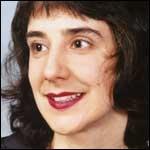 Sinead Morrissey was born in Portadown in 1972 and read English and German at Trinity College, Dublin, from which she took her PhD in 2003. In 1990 she received the Patrick Kavanagh Award for Poetry and in 1996 she won an Eric Gregory Award for the manuscript of her first book, There was Fire in Vancouver (Carcanet, 1996). Her second book, Between Here and There (2002) was shortlisted for the T.S. Eliot Award. She lived and worked in Japan and New Zealand and now lives in Northern Ireland, where she has been writer-in-residence at Queen's University, Belfast. Her most recent collection, The State of the Prisons, was a Poetry Book Society Recommendation.
Sinead Morrissey was born in Portadown in 1972 and read English and German at Trinity College, Dublin, from which she took her PhD in 2003. In 1990 she received the Patrick Kavanagh Award for Poetry and in 1996 she won an Eric Gregory Award for the manuscript of her first book, There was Fire in Vancouver (Carcanet, 1996). Her second book, Between Here and There (2002) was shortlisted for the T.S. Eliot Award. She lived and worked in Japan and New Zealand and now lives in Northern Ireland, where she has been writer-in-residence at Queen's University, Belfast. Her most recent collection, The State of the Prisons, was a Poetry Book Society Recommendation.*
From time to time, I'll be leaving notes, comments, and very brief reviews here, regarding collections of poetry I am currently reading - very unofficial and not at all meant to summarize or in fact review at all. The first in this occasional series is The State of the Prisons, by Sinead Morrissey (see above).
I haven't finished the collection - I love to dip and swoon in and out of a poetry book like a ladle into water - but have enjoyed several of the shorter poems, especially. I recognize the poem "In Praise of Salt" from the anthology I edited for Salt (100 Poets Against The War) of course (and wonder where the acknowledgement for that is, but never mind) - but to my mind the three finest poems in the book (so far, for me) are:
"Genetics"
"Migraine"
and
"Zero"
*
Morrissey has a very good way with incorporating the body (or bodies) in to history, and vice versa. She's somewhat famous for her historical, sensuous eye, in fact - she makes inventories you can live with, surveys that vivify old ground. In "Migraine" the Russian hostage stand-off in the theatre we all remember, which ended so badly, begins, for one hostage, with a migraine - their own body taking control of them, doing damage - so you get a Russian doll of pain.
"Genetics" covers what might be already a trope stretched too thin - how many DNA poems can any one actually need? - but has the exceptional last line: "We know our parents make us by our hands" which has something of the lasting quality we expect in the very best poetry written in the Hardy-Larkin line.
"Zero" seems to me to be even better than these seriously good poems, though - a poem that, as far as mainstream Irish and British writing goes, seems destined to be representative of the dates 2000-2010. That it is, it's a poem of the decade. Why?
Well, the conceit is delightful and compact - Alexander is bringing "zero" to the Greeks - and the poem works this out - "this number / no-number would eat the world" - in ways both colourful and intelligent - it's wit on the move. It is also a relief to see someone Irish redeem Alexander after the woeful Colin Farrell murdered the man with his bleached portrait in the eponymous Stone film of late (I loved JFK).
I have just spotted another poem in the book I want to read; "Gobi from the Air".
But, I can be lazy traveller in reading - stopping and starting as I please - so I'll save it for another day. Morrissey's collection is worth the effort required to cross the sands, and is certainly a contender for this year's incoming T.S. Eliot Awards to be held in London.
Comments